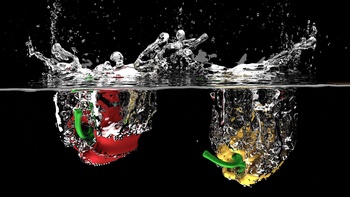Common symptoms and dietary alterations
This section looks at some of the more common symptoms of IBD and how altering your diet may help you manage or reduce them.
DIARRHEA
Diarrhea is one of the main symptoms of IBD. If you have a lot of diarrhoea and pain you may find it tempting to stop eating. However, it is important to continue eating and drinking enough in order to stay nourished and hydrated. Some people find that certain foods, such as those containing a lot of fibre, can make their diarrhoea worse. It may help to avoid these foods during a flare-up. Spicy and fatty foods, alcohol and caffeine can also increase diarrhoea. For more information about diarrhoea, and suggestions on how to deal with it, see our information sheet Diarrhoea and Constipation.
DEHYDRATION
Dehydration can be a particular worry for people with IBD, especially if you suffer from diarrhoea. Once you have become dehydrated however, just drinking plain water may not be enough, because you will have lost sugars and essential salts as well as water. If your diarrhoea is severe, then fluid loss may be replaced by taking an electrolyte mixture such as Dioralyte rather than water alone. Or, it can be effective to drink water or a flat cola drink, and eat a salty snack such as a packet of crisps. For more information about dehydration, and ways to avoid and treat it, see our information sheet Dehydration.
BLOATING AND WIND
Many people with IBD are concerned about the effects of bloating and wind, such as such as tummy gurgles and flatulence (breaking wind). Bloating and wind may come from swallowing too much air when eating or talking. It can also be caused by over-production of gas by bacteria in the colon. If you want to reduce the amount of gas you are passing, you could try cutting down on foods that are known to be more gas producing. Common examples include spicy foods, legumes (peas, beans), and brassica vegetables (cabbages, cauliflower, broccoli). Fizzy drinks, caffeine and foods containing sorbitol (an artificial sweetener) have also been found to increase bloating and wind. For more information, see our information sheet Bloating and Wind.
CONSTIPATION
Some people with IBD have constipation, particularly if they have proctitis (inflammation of the rectum). Constipation can be defined as opening the bowels fewer than three times a week, needing to strain, or passing hard pellet-like stools (faeces). You may find a stool passing through an area of inflammation in the colon particularly painful. Drinking plenty of fluids may help form softer stools which are easy to pass. It may also help to increase the amount of fibre in your diet, although this is not suitable for all people. If you are worried about constipation, speak to your IBD team or doctor. Some people may find oral fibre supplements or a stool softening laxative help to form easily passed stools - but you should talk to your IBD team first. For more information, see our information sheet Diarrhea and Constipation.
UNDER-NUTRITION AND WEIGHT LOSS
Fluctuating weight is commonly seen in people with IBD, reflecting flare-ups and periods of remission. Weight loss can be a good indicator that you are not getting enough nutrients, and you should tell your IBD team if you have lost weight unintentionally. During a flare-up it is important to try and maintain your weight. Ways to put on weight could include eating little and often through the day, eating plenty of protein and energy rich foods, and simple alterations such as drinking soups and juices rather than just tea and coffee. Diets to increase or gain weight should be discussed with your IBD team to ensure that you are maintaining a healthy balance.









